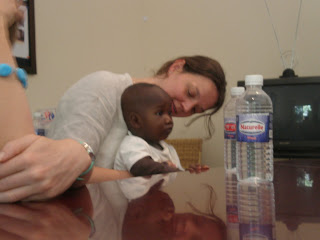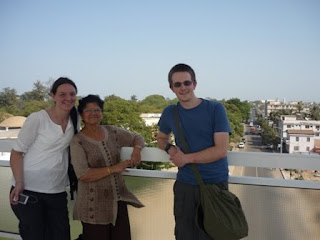 shaking hands with a croc
shaking hands with a croc
(Mohammed again!)


Sifting rice baobab tree

slicing okra

We are going to the market with our language teachers tomorrow so I have to swat up on my market vocabulary like - I’m a volunteer I don’t have much money. ( M man koodoo soto n te mu volunteer le ti) I’m learning! I also know how to say leave me alone (m bula) and goodbye (fo naato) which have come in handy. The general greeting here is Salaam aleykum and the response maleeykum salaam which is a general arabic greeting. Mandinka isn't a written language really, so the spellings vary. Lots of words that they don’t really have in Mandinka you just add oo. But like in Welsh.
So we went to market. It was early afternoon and extremely hot. Most of us have the typically British approach to haggling ie pay the first price they offer. Its all a bit confusing as to what you are supposed to haggle for and what you aren’t. A lot of things particularly food stuffs sold in cups or bags are fixed price. We came away from our market trip with some tomatoes, a bag of okra and some chilli peppers. We did engage in some Mandinka banter with the market ladies who seemed quite amused by us.
We have been a bit braver with the shopping, buying bread and sandwiches from the bitikos which are little shacks on the corner of the streets that sell tapalapa which is the Gambian bread. For about 10 dalasi you can get a sandwich with mayo or beans. I also got a squashed beetle and some ants in mine but it still tasted nice!
We had a recipe sharing day today which was really good fun. Maimuna who is in charge of admin at the vso office and nya Isatou showed us how to make beef domoda and okra stew and introduced us to some of the more unusual Gambian vegetables like bitter tomatoes, okra, sorrel leaf. Domoda is a traditional dish here made with meat and vegetables and lots of peanut butter. Maimuna also showed us how to make a drink out of Wanjo (dried red leaves looks a bit like pot pourri) and another drink out of the fruit of the baobab tree. Sometimes called the monkey bread tree or if you want its scientific name Adonsonia Digitalis. I think any benefits such as the vitamin c, calcium etc are negated by the amount of sugar and vanilla sugar they put in it to make it taste nice. The domoda was very nice but the okra stew not so nice and it had pieces of African land snail in it! It was fun using the giant pestle and mortar to grind the chillies and spices but when I did the tomatoes I ended up with most of it splattered up my trousers and the walls! The Gambians just estimate everything when they're cooking but it seems to turn out well. They also don't waste any of their ingredients. They use everything.
It was a good day though because me and Kate got to babysit Mohammed while everyone else did their exam. Now we are having a celebratory baobab juice in our favourite internet cafe Timbuktoo which has a lovely breezy balcony where you can escape the intense heat. It's getting hotter every day and walking any where is punishing. Thank God for the orange stalls every 100 yards down the street where they peel the orange for you and cut off the top and you suck the juice out. They're really refreshing and only 2 dalasi.








